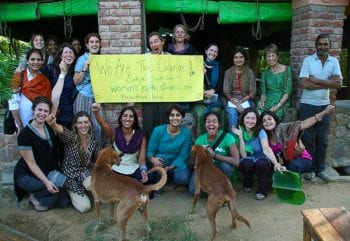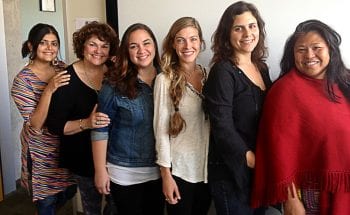Melinda Kramer graduated from WashU in 2003 with a B.A. in Cultural Anthropology and Environmental Studies. In addition to working with various NGO’s, such as CARE International, Pacific Environment, and the Natural Capital Institute, Melinda is best known for her founding of The Women’s Earth Alliance (WEA), a nonprofit that seeks to foster sustainability while also empowering women and indigenous populations around the globe.
Jacob Plotkin, an intern with the Office of Sustainability, spoke with Melinda to learn more about her professional career and gain further insight into how WashU has helped bring her to where she is today.
This is the second of a three-part interview with Melinda on her journey through the world of sustainability. If you haven’t read the beginning of Melinda’s story, you can find the first part of her interview here. In this section, we discuss the WEA, its impact, and its future.
Tell us about the “WEA Effect”
To date, more than 5,000 women have accessed WEA trainings, reaching an additional 750,000 people in 18 countries with their environmental innovations. Regardless of the unique conditions in each region, the efforts of WEA participants lead to a consistent set of cascading benefits that we call the “WEA Effect”: women are empowered, children are safer, communities are healthier, natural resources regenerate, local economies prosper, regions stabilize, and lasting transformation takes root.
Take Binta Yahaya, for example. She is a community mobilizer and environmental advocate from Lere, a rural town in Kaduna State, Nigeria. In her town, most women and girls cook over open fires, and many suffer chronic respiratory infections and other health problems from the toxic smoke. Few are aware that cooking with an open fire is like burning 400 cigarettes an hour in your kitchen or that firewood smoke is the 3rd largest killer of women and children in Nigeria. Even Binta didn’t know what to do about the dangerous accumulation of dirty soot on her own traditional cookstove. Then she participated in the 9-month 2017-2018 WISE Women’s Clean Cookstove Training and learned of powerful alternatives. Within 1 week of entrepreneurship, leadership, and technical training, Binta sold 70 clean cookstoves to women in her village. She quickly watched this simple solution reduce sickness, medical bills, and daily fuel costs for these families. Today, Binta is a clean cookstove entrepreneur, and as a trusted member of her community, people listen. She also launched a second business producing her own clean cookstove model and selling cooking fuel made from agricultural waste instead of charcoal. Every day she improves the lives of people (1,000 already have access to clean energy and improved health because of her), mentors more women entrepreneurs, and plays a part in Nigeria’s clean energy future. On the last day of the training she said, “You have already changed my life…if I had to pay for what I learned from you, I don’t think I could afford it. I have no words to say thank you.”
A large portion of your projects entail collaborating with other grassroots organizations. What do you see as the benefit of collaboration in your work?
In every project, WEA forms strategic partnerships with organizations sharing our vision. The unique pairing of several organizations with diverse skills, networks, and resources makes projects stronger, smarter, and more efficient. Rather than competing for funding and addressing water or climate change with a piecemeal approach, WEA and our partners focus on working collaboratively so that we can achieve exponentially greater impact, educate and enroll a broader population, and integrate a diverse set of strategies into the work.
Women leaders in WEA projects often participate in teams of two. Returning from a training with the task of introducing something new and innovative to one’s community is not easy. As a team, women can map out strategies together.
Tell us about a WEA project that you feel truly made a difference.
WEA works with women like Olanike, who took a year-long WEA training and went on to create her own NGO in Nigeria, galvanize funding and global attention, and launch her own clean cookstoves program. This program trained 30 women to launch and grow clean cookstoves businesses in a country where smoke-related illness is the number 3 killer of women and where the deforestation rate is the highest in the world. With the support of WEA, less than a year after Olanike launched her project, over 9,000 people were using life-saving clean cookstoves and 30 women entrepreneurs were growing successful businesses. Check out this video from the training. In addition to learning hard skills all week, our participants also created a Clean Cookstoves Anthem with a 3-part harmony! WEA works with hundreds of Olanikes around the world, creating a ripple of environmental action and women’s empowerment desperately needed at this time.
How would you like to see WEA grow in the future?
Both the Sustainable Development Goals and the watershed book “Drawdown” conclude that empowering women and girls is one of the greatest leverage points for successfully addressing climate change and humanity’s resilience. When women’s knowledge is centered, and they can access needed resources, networks, and visibility, everyone benefits. Local economies prosper, democracy strengthens, health and education improve, and ecosystems vital to our survival regenerate. Peace, prosperity, and planetary health are inextricably linked, and women are the glue that brings these vital components together.
For 12 years, WEA has identified and resourced these women leaders, and we are now taking our training model to scale by reaching more women and bridging grassroots efforts across regions in order to catalyze global environmental change. The Ripple Academy is a global training program that equips leaders with resources and tools to forge high-impact environmental solutions that scale. Building from the success of WEA’s model — developed over more than a decade of supporting grassroots women leaders at the verge of scaling critical solutions — the Ripple Academy will guide multiple cohorts of women leaders through a year-long “blended-learning” training. This will combine regional gatherings and online education to exponentially advance women’s environmental solutions and influence global environmental goals. Technical and entrepreneurship training, a networking platform, leadership skills, and mentorship will empower participants to organize communities, mobilize resources, and launch environmental projects and campaigns.
Follow this link to read the next and last part of Melinda’s interview.

